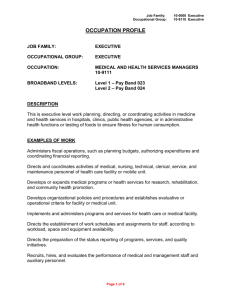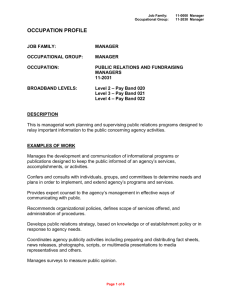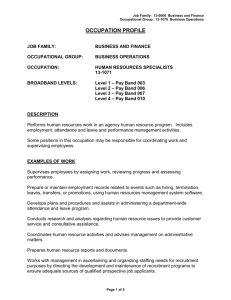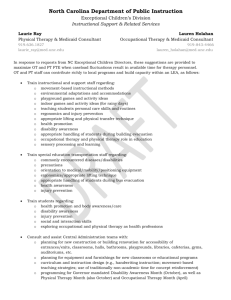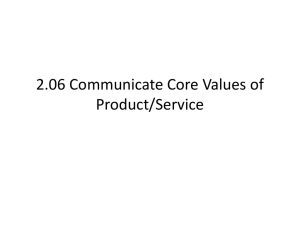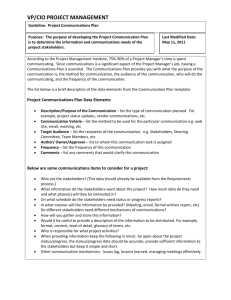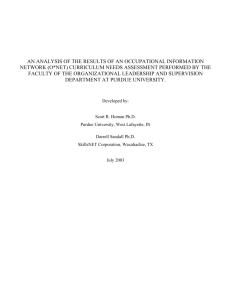education administrators, postsecondary
advertisement
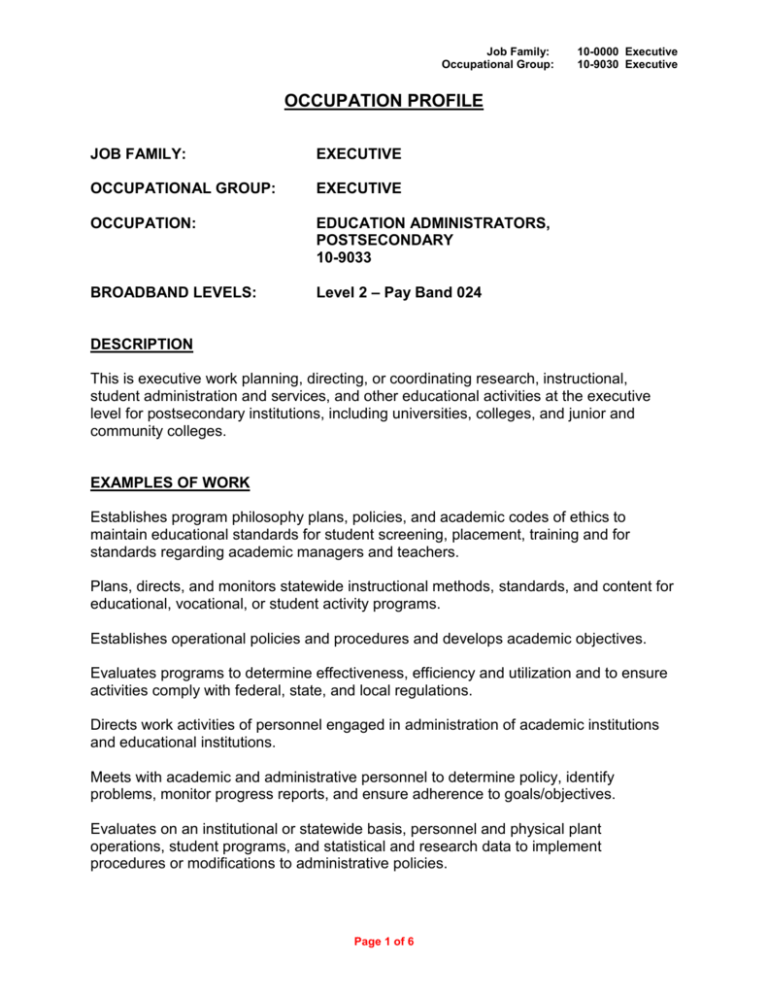
Job Family: Occupational Group: 10-0000 Executive 10-9030 Executive OCCUPATION PROFILE JOB FAMILY: EXECUTIVE OCCUPATIONAL GROUP: EXECUTIVE OCCUPATION: EDUCATION ADMINISTRATORS, POSTSECONDARY 10-9033 BROADBAND LEVELS: Level 2 – Pay Band 024 DESCRIPTION This is executive work planning, directing, or coordinating research, instructional, student administration and services, and other educational activities at the executive level for postsecondary institutions, including universities, colleges, and junior and community colleges. EXAMPLES OF WORK Establishes program philosophy plans, policies, and academic codes of ethics to maintain educational standards for student screening, placement, training and for standards regarding academic managers and teachers. Plans, directs, and monitors statewide instructional methods, standards, and content for educational, vocational, or student activity programs. Establishes operational policies and procedures and develops academic objectives. Evaluates programs to determine effectiveness, efficiency and utilization and to ensure activities comply with federal, state, and local regulations. Directs work activities of personnel engaged in administration of academic institutions and educational institutions. Meets with academic and administrative personnel to determine policy, identify problems, monitor progress reports, and ensure adherence to goals/objectives. Evaluates on an institutional or statewide basis, personnel and physical plant operations, student programs, and statistical and research data to implement procedures or modifications to administrative policies. Page 1 of 6 Job Family: Occupational Group: 10-0000 Executive 10-9030 Executive Develops, reviews and interprets government codes and develops programs to ensure facility safety, security, and maintenance. Estimates and allocates department funding based on financial success, needs, and other pertinent factors. Completes and submits operating budget for approval, controls expenditures, and maintains financial reports and records. Collects and analyzes survey data, regulatory information, and demographic and employment trends to forecast enrollment patterns and curriculum changes. Consults with staff and subject experts to determine needs/feasibility, and to formulate policies and educational programs. Organizes and directs committees of specialists, volunteers, and staff to provide technical and advisory assistance for programs. Contacts and addresses commercial, community, or political groups to promote educational programs and services or lobby for legislative changes. Represents the state where required with accrediting agencies and to exchange information between academic institutions and in community. Negotiates with foundation and industry representatives to secure assets for state educational needs and to identify costs and materials for building construction. Coordinates outreach activities with businesses, communities, and other institutions or organizations to identify educational needs, and establish and coordinate programs. Audits financial status of individual institutions and facility accounts. EXAMPLES OF JOB CHARACTERISTICS Performing Administrative Activities Approving requests, handling paperwork, and performing day-to-day administrative tasks. Making Decisions and Solving Problems Combining, evaluating, and reasoning with information and data to make decisions and solve problems. These processes involve making decisions about the relative importance of information and choosing the best solution. Page 2 of 6 Job Family: Occupational Group: 10-0000 Executive 10-9030 Executive Establishing and Maintaining Relationships Developing constructive and cooperative working relationships with others. Communicating With Persons Outside Organization Communicating with persons outside the organization, representing the organization to customers, the public, government, and other external sources. This information can be exchanged face-to-face, in writing, or via telephone/electronic transfer. Observing, receiving, and otherwise obtaining information from all relevant sources. Getting Information Needed to do the Job Monitoring and Controlling Resources Monitoring and controlling resources and overseeing the spending of money. Communicating With Other Workers Providing information to supervisors, fellow workers, and subordinates. This information can be exchanged face-to-face, in writing, or via telephone/electronic transfer. Recruiting, interviewing, selecting, hiring, and promoting persons for the organization. Staffing Organizational Units Analyzing Data or Information Identifying underlying principles, reasons, or facts by breaking down information or data into separate parts. Communicating With Other Workers Providing information to supervisors, fellow workers, and subordinates. This information can be exchanged face-to-face, in writing, or via telephone/electronic transfer. Establishing long-range objectives and specifying the strategies and actions to achieve these objectives. Developing Objectives and Strategies Coordinating Work and Activities of Others Coordinating members of a work group to accomplish tasks. Page 3 of 6 Job Family: Occupational Group: 10-0000 Executive 10-9030 Executive Provide Consultation and Advice to Others Providing consultation and expert advice to management or other groups on technical, systems-related, or process related topics. Implementing Ideas, Programs, etc. Conducting or carrying out work procedures and activities in accord with one's own ideas or information provided through directions/instructions for purposes of installing, modifying, preparing, delivering, constructing, integrating, finishing, or completing programs, systems, structures, or products. Developing plans to accomplish work, and prioritizing and organizing one's own work. Organizing, Planning, and Prioritizing EXAMPLES OF KNOWLEDGE, SKILLS AND ABILITIES Management of Financial Resources Determining how money will be spent to get the work done, and accounting for these expenditures Judgment and Decision Making Weighing the relative costs and benefits of a potential action Coordination Adjusting actions in relation to others' actions Management of Personnel Resources Motivating, developing, and directing people as they work, identifying the best people for the job Speaking Talking to others to effectively convey information Reading Comprehension Understanding written sentences and paragraphs in work related documents Identification of Key Causes Identifying the things that must be changed to achieve a goal Visioning Developing an image of how a system should work under ideal conditions Page 4 of 6 Job Family: Occupational Group: 10-0000 Executive 10-9030 Executive Information Gathering Knowing how to find information and identifying essential information Systems Evaluation Looking at many indicators of system performance, taking into account their accuracy Social Perceptiveness Being aware of others' reactions and understanding why they react the way they do Writing Communicating effectively with others in writing as indicated by the needs of the audience Critical Thinking Using logic and analysis to identify the strengths and weaknesses of different approaches Active Listening Listening to what other people are saying and asking questions as appropriate Administration and Management Knowledge of principles and processes involved in business and organizational planning, coordination, and execution. This may include strategic planning, resource allocation, manpower modeling, leadership techniques, and production methods Education and Training Knowledge of instructional methods and training techniques including curriculum design principles, learning theory, group and individual teaching techniques, design of individual development plans, and test design principles Economics and Accounting Knowledge of economic and accounting principles and practices, the financial markets, banking, and the analysis and reporting of financial data English Language Knowledge of the structure and content of the English language including the meaning and spelling of words, rules of composition, and grammar Page 5 of 6 Job Family: Occupational Group: 10-0000 Executive 10-9030 Executive Personnel and Human Resources Knowledge of policies and practices involved in personnel/human resource functions Mathematics Knowledge of numbers, their operations, and interrelationships including one or more of the following: arithmetic, algebra, geometry, calculus, statistics, and their applications Communications and Media Knowledge of media production, communication, and dissemination techniques and methods including alternative ways to inform and entertain via written, oral, and visual media Law, Government and Jurisprudence Knowledge of laws, legal codes, court procedures, precedents, government regulations, executive orders, agency rules, and the democratic political process Sales and Marketing Knowledge of principles and methods involved in showing, promoting, and selling products or services. This may include marketing strategies and tactics, product demonstration and sales techniques, and sales control systems Psychology Knowledge of human behavior and performance, mental processes, psychological research methods, and the assessment and treatment of behavioral and affective disorders LICENSURE, CERTIFICATION OR REGISTRATION REQUIREMENTS EFFECTIVE: 07/01/2002 Page 6 of 6
